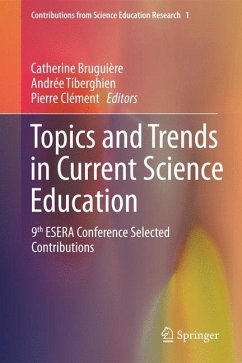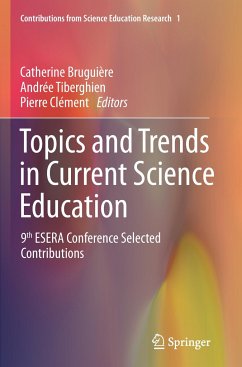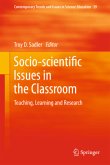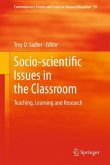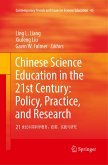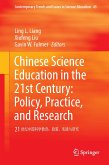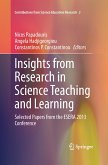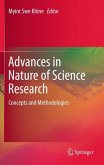Topics and Trends in Current Science Education
9th ESERA Conference Selected Contributions
Herausgegeben:Bruguière, Catherine; Tiberghien, Andrée; Clément, Pierre
Topics and Trends in Current Science Education
9th ESERA Conference Selected Contributions
Herausgegeben:Bruguière, Catherine; Tiberghien, Andrée; Clément, Pierre
- Gebundenes Buch
- Merkliste
- Auf die Merkliste
- Bewerten Bewerten
- Teilen
- Produkt teilen
- Produkterinnerung
- Produkterinnerung
This book features 35 of best papers from the 9th European Science Education Research Association Conference, ESERA 2011, held in Lyon, France, September 5th-9th 2011. The ESERA international conference featured some 1,200 participants from Africa, Asia, Australia, Europe as well as North and South America offering insight into the field at the end of the first decade of the 21st century.This book presents studies that represent the current orientations of research in science education and includes studies in different educational traditions from around the world. It is organized into six…mehr
Andere Kunden interessierten sich auch für
![Topics and Trends in Current Science Education Topics and Trends in Current Science Education]() Topics and Trends in Current Science Education75,99 €
Topics and Trends in Current Science Education75,99 €![Socio-scientific Issues in the Classroom Socio-scientific Issues in the Classroom]() Socio-scientific Issues in the Classroom149,99 €
Socio-scientific Issues in the Classroom149,99 €![Socio-scientific Issues in the Classroom Socio-scientific Issues in the Classroom]() Socio-scientific Issues in the Classroom149,99 €
Socio-scientific Issues in the Classroom149,99 €![Chinese Science Education in the 21st Century: Policy, Practice, and Research Chinese Science Education in the 21st Century: Policy, Practice, and Research]() Chinese Science Education in the 21st Century: Policy, Practice, and Research113,99 €
Chinese Science Education in the 21st Century: Policy, Practice, and Research113,99 €![Chinese Science Education in the 21st Century: Policy, Practice, and Research Chinese Science Education in the 21st Century: Policy, Practice, and Research]() Chinese Science Education in the 21st Century: Policy, Practice, and Research112,99 €
Chinese Science Education in the 21st Century: Policy, Practice, and Research112,99 €![Insights from Research in Science Teaching and Learning Insights from Research in Science Teaching and Learning]() Insights from Research in Science Teaching and Learning75,99 €
Insights from Research in Science Teaching and Learning75,99 €![Advances in Nature of Science Research Advances in Nature of Science Research]() Advances in Nature of Science Research113,99 €
Advances in Nature of Science Research113,99 €-
-
-
This book features 35 of best papers from the 9th European Science Education Research Association Conference, ESERA 2011, held in Lyon, France, September 5th-9th 2011. The ESERA international conference featured some 1,200 participants from Africa, Asia, Australia, Europe as well as North and South America offering insight into the field at the end of the first decade of the 21st century.This book presents studies that represent the current orientations of research in science education and includes studies in different educational traditions from around the world. It is organized into six parts around the three poles (content, students, teachers) and their interrelations of science education: after a general presentation of the volume (first part), the second part concerns SSI (Socio-Scientific Issues) dealing with new types of content, the third the teachers, the fourth the students, the fifth the relationships between teaching and learning, and the sixth the teaching resources and the curricula.
Produktdetails
- Produktdetails
- Contributions from Science Education Research 1
- Verlag: Springer / Springer Netherlands
- Artikelnr. des Verlages: 86150797, 978-94-007-7280-9
- 2014
- Seitenzahl: 612
- Erscheinungstermin: 9. Dezember 2013
- Englisch
- Abmessung: 241mm x 160mm x 39mm
- Gewicht: 1146g
- ISBN-13: 9789400772809
- ISBN-10: 9400772807
- Artikelnr.: 38548748
- Herstellerkennzeichnung Die Herstellerinformationen sind derzeit nicht verfügbar.
- Contributions from Science Education Research 1
- Verlag: Springer / Springer Netherlands
- Artikelnr. des Verlages: 86150797, 978-94-007-7280-9
- 2014
- Seitenzahl: 612
- Erscheinungstermin: 9. Dezember 2013
- Englisch
- Abmessung: 241mm x 160mm x 39mm
- Gewicht: 1146g
- ISBN-13: 9789400772809
- ISBN-10: 9400772807
- Artikelnr.: 38548748
- Herstellerkennzeichnung Die Herstellerinformationen sind derzeit nicht verfügbar.
Part 1: Overview of the book.- Overview of the book, Catherine Bruguière, Andrée Tiberghien, Pierre Clément.- Part 2: Socio-Scientific Issues.- The Need for a Public Understanding of Sciences, Isabelle Stengers.- Questions Socialement Vives and Socio-Scientific Issues: New Trends of Research to Meet the Training Needs of Post-Modern Society, Laurence Simonneaux.- Teachers' Beliefs, Classroom Practices and Professional Development towards Socio-Scientific Issues, Virginie Albe, Catherine Barrué, Larry Bencze, Anne Kristine Byhring, Lyn Carter, Marcus Grace, Erik Knain, Dankert Kolstø, Pedro Reis and Erin Sperling.- Which perspectives are referred in students' arguments about a Socio-scientific Issue? The case of Bears' reintroduction in the Pyrenees, Ana Mª Domènech and Conxita Márquez.- Learning about the role and function of science in public debate as an essential component of scientific literacy, Ingo Eilks, Jan A. Nielsen, Avi Hofstein.- Exploring Secondary Students' Arguments in the Context of Socio-scientific Issues, Dr. Fatih Çaglayan Mercan, Dr. Buket Yakmaci-Güzel, and Dr. Füsun Akarsu.- Teachers' Beliefs on Science-Technology-Society (STS) and Nature of Science (NOS): Strengths, Weaknesses, and Teaching Practice, Ángel Vázquez-Alonso; María-Antonia Manassero-Mas; Antonio García-Carmona and Antoni Bennàssar-Roig.- Part 3: Teachers' Practices and Teachers Professional Development.- Professional Learning of Science Teachers, Jan H. Van Driel.- Nanoeducation: Zooming into Teacher Professional DevelopmentPrograms in Nanoscience and Technology, Ron Blonder, Ilka Parchmann, Sevil Akaygun, and Virginie Albe.- Education for Sustainable Development: An International Survey on Teachers' Conceptions, Pierre Clément and Silvia Caravita.- Learning to Teach Science as Inquiry: Developing an Evidence-based Framework for Effective Teacher Professional Development, Barbara A. Crawford, Daniel K. Capps, Jan van Driel, Norman Lederman, Judith Lederman, Julie Luft, Sissy Wong, Aik Ling Tan , Shirley Lim, John Loughran, Kathy Smith.- Weaving Relationships in a Teaching Sequence Using ICT: A Case Study in Optics at Lower Secondary School, Suzane El Hage, Christian Buty.- Inquiry based mathematics and science education across Europe: A synopsis of various approaches and their potentials, Katrin Engeln, Silke Mikelskis-Seifert, Manfred Euler.- Measuring Chemistry Teachers' Content Knowledge - Is it correlated to Pedagogical Content Knowledge? Oliver Tepner and Sabrina Dollny.- PART 4: The students - Multiple Perspectives.- Boys in Physics Lessons: Focus on Masculinity in an Analysis of Learning Opportunities, Josimeire M. Julio, Arnaldo M. Vaz.- Which Effective Competencies Do Students Use in PISA Assessment of Scientific Literacy? Florence Le Hebel, Pascale Montpied, Andrée Tiberghien.- Development of Understanding in Chemistry, Hannah Sevian, Vicente Talanquer, Astrid M. W. Bulte, Angelica Stacy, Jennifer Claesgens.- Learning Affordances: Understanding Visitors' Learning in Science Museum Environment,Hyeonjeong Shin, Eun Ji Park, Chan-Jong Kim.- Modelling and Assessing Experimental Competencies in Physics, Heike Theyßen, Horst Schecker, Christoph Gut, Martin Hopf, Jochen Kuhn, Peter Labudde, Andreas Müller, Nico Schreiber, Patrik Vogt.- Understanding Students' Conceptions of Electromagnetic Induction: A Semiotic Analysis, Jennifer Yeo.- Part 5 Relationships between Teaching and Learning.- Analysing Classroom Activities: Theoretical and Methodological Considerations, Gregory J. Kelly.- The Impact of a Context-led Curriculum on Different Students' Experiences of School Science, Indira Banner & Jim Ryder.- Students' Experienced Coherence between Chemistry and Biology in Context-Based Secondary Science Education, Hilde J. Boer, Gjalt T. Prins, Martin J. Goedhart and Kerst Th. Boersma.- The Relationship between Teaching and Learning of Chemical Bonding and Structures, Ray Lee, Maurice M. W. Cheng.- Blending Physical and Virtual Manipulatives in Physics Laboratory Experimentation, Georgios Olympiou & Zacharias C. Zacharia.- Becoming a Health Promoting School: Effects of a three year intervention on school development and pupils, Steffen Schaal.- Disagreement in 'Ordinary' Teaching Interactions: A Study of Argumentation in a Science Classroom, Ana Paula Souto-Silva, Danusa Munford.- Analysis of Teaching and Learning Practices in Physics and Chemistry Education: Theoretical and Methodological Issues, Patrice Venturini, Andrée Tiberghien, Claudia von Aufschnaiter, Gregory Kelly, Eduardo Mortimer.- Part 6 Teaching Resources, Curriculum.- Designing a Learning Progression forTeaching and Learning about Matter in Early School Years, Andrés Acher & María Arcà.- 'Realistic-Fiction Storybooks' as a Resource for Problematic Questioning of Living Being with Pupils in Primary School, Catherine Bruguière and Eric Triquet.- Nature of Science as Portrayed in the Physics Official Curricula and Textbooks in Hong Kong and on the Mainland of the People's Republic of China, Ka Lok Cheng and Siu Ling Wong.- On the transfer of teaching-learning materials from one educational setting to another, R. Pintó, M. Hernández, C. P. Constantinou.- CoReflect - Web-based Inquiry Learning Environments on Socio-Scientific issues, Andreas Redfors, Lena Hansson, Eleni A. Kyza, Iolie Nicolaidou, Itay Asher, Iris Tabak, Nicos Papadouris and Christakis Avraam.- Adapting web-based inquiry learning environments from one country to another: The CoReflect experience, Eleni A. Kyza, Christothea Herodotou, Iolie Nicolaidou, Andreas Redfors and Lena Hansson, Sascha Schanze, Ulf Saballus, Nicos Papadouris4, Georgia Michael.
Part 1: Overview of the book.- Overview of the book, Catherine Bruguière, Andrée Tiberghien, Pierre Clément.- Part 2: Socio-Scientific Issues.- The Need for a Public Understanding of Sciences, Isabelle Stengers.- Questions Socialement Vives and Socio-Scientific Issues: New Trends of Research to Meet the Training Needs of Post-Modern Society, Laurence Simonneaux.- Teachers' Beliefs, Classroom Practices and Professional Development towards Socio-Scientific Issues, Virginie Albe, Catherine Barrué, Larry Bencze, Anne Kristine Byhring, Lyn Carter, Marcus Grace, Erik Knain, Dankert Kolstø, Pedro Reis and Erin Sperling.- Which perspectives are referred in students' arguments about a Socio-scientific Issue? The case of Bears' reintroduction in the Pyrenees, Ana Mª Domènech and Conxita Márquez.- Learning about the role and function of science in public debate as an essential component of scientific literacy, Ingo Eilks, Jan A. Nielsen, Avi Hofstein.- Exploring Secondary Students' Arguments in the Context of Socio-scientific Issues, Dr. Fatih Çaglayan Mercan, Dr. Buket Yakmaci-Güzel, and Dr. Füsun Akarsu.- Teachers' Beliefs on Science-Technology-Society (STS) and Nature of Science (NOS): Strengths, Weaknesses, and Teaching Practice, Ángel Vázquez-Alonso; María-Antonia Manassero-Mas; Antonio García-Carmona and Antoni Bennàssar-Roig.- Part 3: Teachers' Practices and Teachers Professional Development.- Professional Learning of Science Teachers, Jan H. Van Driel.- Nanoeducation: Zooming into Teacher Professional DevelopmentPrograms in Nanoscience and Technology, Ron Blonder, Ilka Parchmann, Sevil Akaygun, and Virginie Albe.- Education for Sustainable Development: An International Survey on Teachers' Conceptions, Pierre Clément and Silvia Caravita.- Learning to Teach Science as Inquiry: Developing an Evidence-based Framework for Effective Teacher Professional Development, Barbara A. Crawford, Daniel K. Capps, Jan van Driel, Norman Lederman, Judith Lederman, Julie Luft, Sissy Wong, Aik Ling Tan , Shirley Lim, John Loughran, Kathy Smith.- Weaving Relationships in a Teaching Sequence Using ICT: A Case Study in Optics at Lower Secondary School, Suzane El Hage, Christian Buty.- Inquiry based mathematics and science education across Europe: A synopsis of various approaches and their potentials, Katrin Engeln, Silke Mikelskis-Seifert, Manfred Euler.- Measuring Chemistry Teachers' Content Knowledge - Is it correlated to Pedagogical Content Knowledge? Oliver Tepner and Sabrina Dollny.- PART 4: The students - Multiple Perspectives.- Boys in Physics Lessons: Focus on Masculinity in an Analysis of Learning Opportunities, Josimeire M. Julio, Arnaldo M. Vaz.- Which Effective Competencies Do Students Use in PISA Assessment of Scientific Literacy? Florence Le Hebel, Pascale Montpied, Andrée Tiberghien.- Development of Understanding in Chemistry, Hannah Sevian, Vicente Talanquer, Astrid M. W. Bulte, Angelica Stacy, Jennifer Claesgens.- Learning Affordances: Understanding Visitors' Learning in Science Museum Environment,Hyeonjeong Shin, Eun Ji Park, Chan-Jong Kim.- Modelling and Assessing Experimental Competencies in Physics, Heike Theyßen, Horst Schecker, Christoph Gut, Martin Hopf, Jochen Kuhn, Peter Labudde, Andreas Müller, Nico Schreiber, Patrik Vogt.- Understanding Students' Conceptions of Electromagnetic Induction: A Semiotic Analysis, Jennifer Yeo.- Part 5 Relationships between Teaching and Learning.- Analysing Classroom Activities: Theoretical and Methodological Considerations, Gregory J. Kelly.- The Impact of a Context-led Curriculum on Different Students' Experiences of School Science, Indira Banner & Jim Ryder.- Students' Experienced Coherence between Chemistry and Biology in Context-Based Secondary Science Education, Hilde J. Boer, Gjalt T. Prins, Martin J. Goedhart and Kerst Th. Boersma.- The Relationship between Teaching and Learning of Chemical Bonding and Structures, Ray Lee, Maurice M. W. Cheng.- Blending Physical and Virtual Manipulatives in Physics Laboratory Experimentation, Georgios Olympiou & Zacharias C. Zacharia.- Becoming a Health Promoting School: Effects of a three year intervention on school development and pupils, Steffen Schaal.- Disagreement in 'Ordinary' Teaching Interactions: A Study of Argumentation in a Science Classroom, Ana Paula Souto-Silva, Danusa Munford.- Analysis of Teaching and Learning Practices in Physics and Chemistry Education: Theoretical and Methodological Issues, Patrice Venturini, Andrée Tiberghien, Claudia von Aufschnaiter, Gregory Kelly, Eduardo Mortimer.- Part 6 Teaching Resources, Curriculum.- Designing a Learning Progression forTeaching and Learning about Matter in Early School Years, Andrés Acher & María Arcà.- 'Realistic-Fiction Storybooks' as a Resource for Problematic Questioning of Living Being with Pupils in Primary School, Catherine Bruguière and Eric Triquet.- Nature of Science as Portrayed in the Physics Official Curricula and Textbooks in Hong Kong and on the Mainland of the People's Republic of China, Ka Lok Cheng and Siu Ling Wong.- On the transfer of teaching-learning materials from one educational setting to another, R. Pintó, M. Hernández, C. P. Constantinou.- CoReflect - Web-based Inquiry Learning Environments on Socio-Scientific issues, Andreas Redfors, Lena Hansson, Eleni A. Kyza, Iolie Nicolaidou, Itay Asher, Iris Tabak, Nicos Papadouris and Christakis Avraam.- Adapting web-based inquiry learning environments from one country to another: The CoReflect experience, Eleni A. Kyza, Christothea Herodotou, Iolie Nicolaidou, Andreas Redfors and Lena Hansson, Sascha Schanze, Ulf Saballus, Nicos Papadouris4, Georgia Michael.

